How Does Voice Call App Help For Enterprises In 2025?
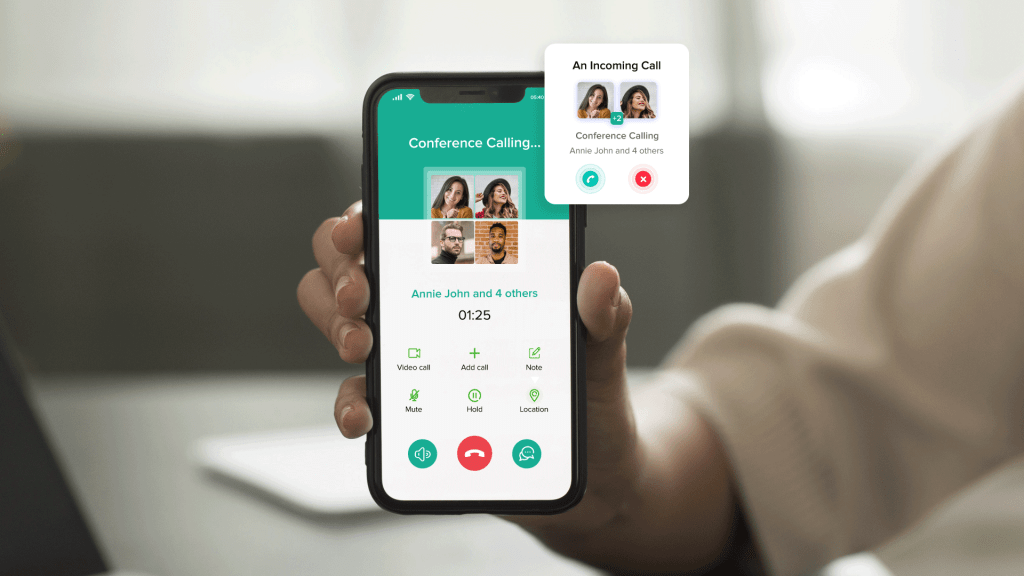
Voice communications have been an essential part of communication for businesses and enterprises. In recent times, voice call app APIs have simplified the integration process of adding voice calls to your business communication apps.
Almost 94% of communication during work time is through voice call App. Among those, 87.5% tend to use video calls for communication types such as meetings, collaborations, high-ticket sales, etc.
In this article, you can find a detailed report of phone call API features and benefits, use cases, why you need one, how they help your business, 6 steps to build one, and the industry-leading voice call app API provider MirrorFly’s overview.
Table of Contents
What is Voice Call API?
A voice call API (application programming interface) is a set of pre-developed programs that allows you to integrate voice call technology with your preferred platforms.
With voice call app APIs, developers can easily integrate voice calling sdk app technology into your website or applications, and users can easily make or receive calls, use call diverting, make one-on-one and group calls, wait for calls, etc.
Voice call APIs generally adopt and function through VoIP (Voice over Internet Protocol), which sends and receives signals through the Internet. It facilitates the global communication of voice calls at a lower cost than traditional phone lines.
Why do you need it?
Building your own voice call app or integrating voice call app APIs into your preferred platform has enormous benefits for increasing your business standards.
With the voice call app API, you can boost your business’s communication performance by providing customer support and team management efficiently.
Moreover, voice calls provide you with the flexibility to attend to important matters in real time. Rather than dropping an email on an urgent matter and leaving it to sleep, someone else’s inbox will definitely put you under pressure. But voice calls can eradicate this issue in a moment.
Finally, there are multiple providers available in the market who provide complete voice call solutions through their APIs and SDKs. You can buy it and easily integrate it into all your platforms, such as Android, iOS, Web, and desktop, at a lower cost than building your own voice call services.
What Are Top Voice Calls Features & Benefits
Voice call APIs allow you multiple features and benefits that meet the standards of modern communication systems. Here are some of the advanced features of voice chat APIs:
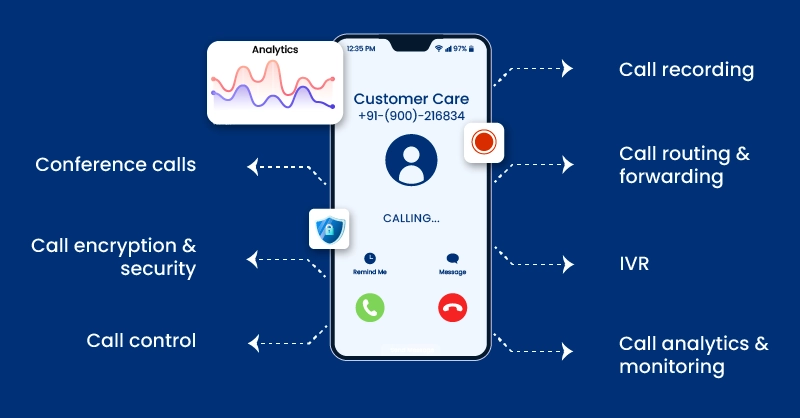
- Call recording: It allows you to record ongoing calls to save them for future reference or transcription. Recording options have helped the telecom industry for quality and training purposes; in IT projects, they help in understanding customer needs, etc.
- Call routing and forwarding: With these options, you can easily forward or route calls to certain departments when an expert in technology is needed. This simplifies the workload of making multiple calls for complex queries and solutions.
- Interactive voice response (IVR): This helps in recording automated voices and playing them back to guide your customers through FAQs or basic queries. By facilitating IVR, you can set reminder calls and minimize the manpower involved.
- Call analytics and monitoring: Voice call APIs provide you with analytics about call duration, call quality, call volume, etc. Through this, you can analyze the metrics of your support agent performance, customer behavior, and system efficiency for future improvements.
- Conference calls: Voice call app APIs may allow you to make conference calls. Where you can invite your team members and pass information, share ideas, collect reports, etc. You can simultaneously add or remove any person from the ongoing call.
- Call encryption and security: Voice call broadcast software APIs are end-to-end encrypted, so only the speaker and receiver can know the context. This enables the user’s privacy to remain protected with advanced security standards.
- Call control: Users can control their call volumes, mute or unmute, hold, divert, swap, and merge ongoing calls. And answering or ending the call is fully controllable by individual users, which gives them their privacy.
These features allow you to communicate in a more modern way, allowing room for your privacy and enriching the user experience.
How does the Voice Call App API help businesses?
- Enhanced customer support: By integrating voice call software app into your websites or applications, you enable your customers to contact your support agents when issues arise. And solving those issues in real-time makes your customers delightful.
- Real-time collaboration: No more waiting time to solve a query in this fast-paced world. Voice call app APIs enable real-time interaction and collaboration between your business, customers, teams, and vendors. This helps you have efficient business communication.
- Improved customer engagement: Keep your customers engaged by giving them opportunities to connect with your business when needed. Customers are said to be more engaged with a business over the long term when they have easier options to contact.
- Voice-enabled applications: With the voice call API integrated audio calling solution into your website and applications, you can add website voice chat features. This helps save time when typing long paragraphs and finding solutions with ease.
- Scalability and cost efficiency: Voice call app APIs help you reach a global audience at a minimal cost. This helps your business scale up by reaching global customers at a lower cost.
- Integration capabilities: Voice call app APIs can be integrated audio calling with other communication channels such as voice and chat. This helps users switch between voice calls, video calls, and instant messages, which improves the overall user experience in a positive manner.
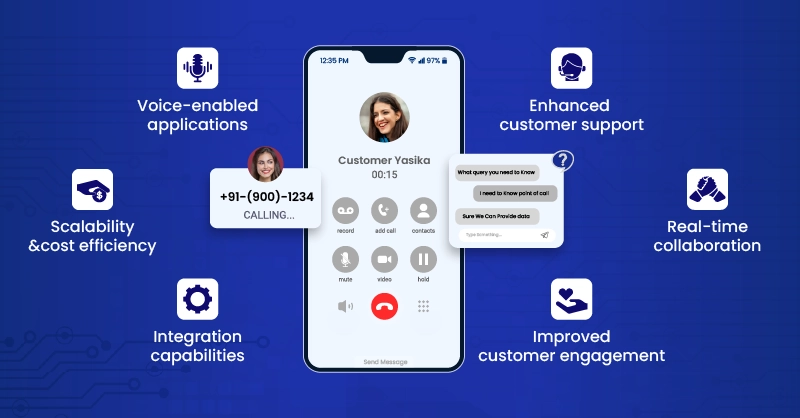
Audio API for business communication
Voice call APIs expose multiple features and benefits in terms of business communication. Here are a few benefits that help improve your business communication standards:
These are a few of the benefits that come in handy the moment you integrate voice call app APIs into your web and mobile applications.
Top 10 Audio / Voice Calling API Use Cases for Enterprise Communication Apps
Voice call APIs can be used in any business or enterprise where effective communication is required. Here we have listed the top 10 enterprises where API voice call app are a must.
- Construction: Integrating API Voip in construction apps helps you connect architects, engineers, contractors, sub-contractors, manual workers, and customers simultaneously to discuss designs, completions, and progress.
- Customer support: Connect your customers and support agents through audio calling phone to solve queries in real-time. Keep them posted with new updates and offers through IVR.
- On-demand: Letting your customers and delivery agents connect in real-time voice call app increases trust and satisfaction in on-demand services.
- Manufacturing: Connecting engineers, project managers, and workers helps in streamlining the manufacturing process.
- Gaming: Keep your gamers connected via building voice call phone while playing games to help each other and succeed as a team. It increases their vibe, and every game becomes a team sport.
- Logistics: Maintain track records for everyone in the supply chain and keep them posted about the process flow with real-time voice platforms.
- Telecommunication: Increase user engagement in your telecom apps by connecting users via VoIP service calls rather than having traditional phone or third-party apps.
- Real estate: A booming industry leaves no room for doubts and queries. Connect with your customers through android voice chat api, follow up with them regularly, grasp their requirements, and give them what they need.
- Retail & Ecommerce: Inform your users about their purchases, price drops, offers, and promotions regularly through voice call app to save their preferences. And also to convert them into sales.
- Transportation: Never let your customers get frustrated by long waiting times without any updates. Connect your drivers and customers through In-app voice call app to keep them posted on updates. It makes them feel good, as they know the status.
These are some of the top use cases for voice call app in enterprises. The primary goal of involving audio calls in communication mode is to keep them posted, reduce waiting time, and solve queries.
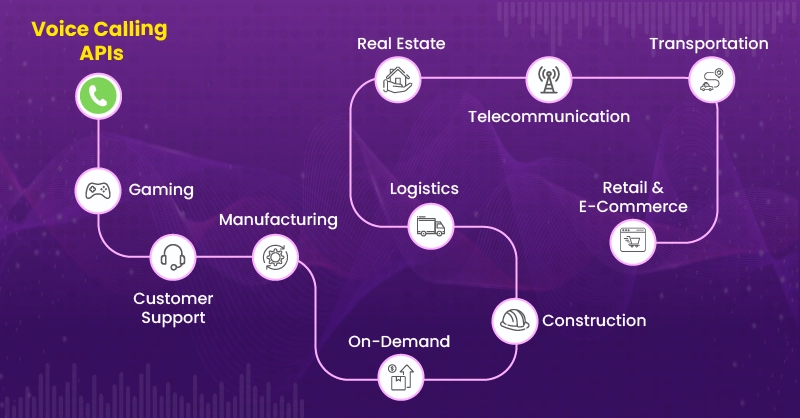
embed voice call feature
6 Steps To Build a Voice Chat App
Building a voip call api involves several technical steps to be followed. Here I have simplified the process of building a voice chat app in six steps:
Step 1: Define app features and requirements.
- Start with the requirements and purpose of your voice chat app. Define its features, such as one-on-one calls or group calls, phone calling api features, user privacy, and everything else.
- Define your target platforms, like Android, iOS, the web, and desktop.
- Personalize your target audience—individual users or enterprises—based on features.
Step 2: Design the user interface
- Concentrate on designing your app’s user interface, like showcasing the features, landing page designs, user flow, benefits, detail structure, etc.
- Use wireframe tools for proper design structures.
Step 3: Setup server infrastructure
- You can either develop or choose a server infrastructure to handle backend operations.
- Servers must be capable of handling real-time communication even at low latencies, like websockets or WebRTC.
Step 4: Implement user authentication and security.
- Implement user authentication so that only authorized users can access your voice chat apps.
- Enable robust security features like end-to-end encryption and AES security standards to protect your users security and privacy.
Step 5: Develop voice communication functionality.
- Custom voice calling app integration API features into your app.
- You can do it either by integrating voip calling APIs for real-time communications, like WebRTC.
- Implement features like access to microphones, call hold and forward, call merge, call waiting, volume controls, etc.
- Test free voice communication at various levels of latency to ensure call quality.
Step 6: Test and deploy
- Test your app’s functionality through various methods to ensure the quality of your product before launching it into the market.
- Debug the errors that arise during the testing period.
- Deploy in the necessary marketplaces and reach out to target audiences.
- Maintain products through regular checkups and keep up providing good service.
By following these six simple steps, you can build your own voice chat app and launch it on your preferred market and platforms.
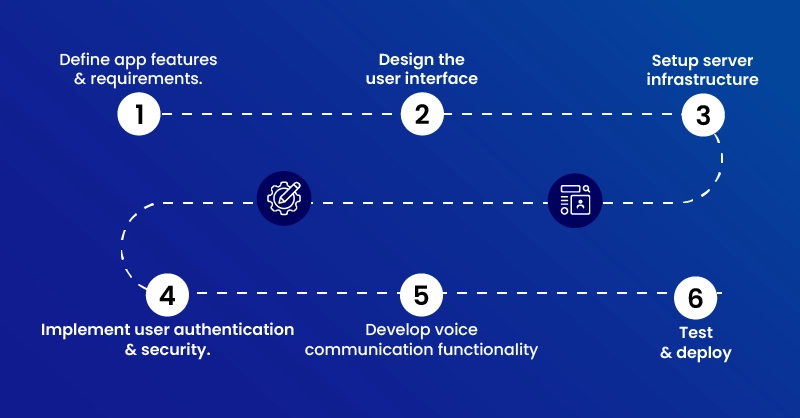
How do MirrorFly voice chat APIs help enterprises increase customer satisfaction and revenue?
MirrorFly is a feature-enriched and secure voice chat appAPI for enterprises. They do offer fully customizable chat, voice, and video APIs for enterprises to eradicate communication gaps.
You can easily integrate MirrorFly’s voice chat app SDK into your preferred platforms in just 20 minutes with a one-time license cost and white label solutions.
They offer ironclad security features like end-to-end encryption and AES 128 security standards to ensure users security and privacy.
Features
Their voice chat app API offers several benefits to enterprises and developers, such as
- One-on-one and group voice calls
- Conference calls
- Call forwarding, Call holding, Call waiting, etc.
- 99.999% uptime SLA
- Hiring a team of dedicated developers
- Ultra-low latencies
- Global reach with best VoIP calls
Moreover, their voicechatapi can be integrated into any platform as they are programmed with multi-platform programming languages.
Whether you use it in iOS, Android, web, or desktop applications, MirrorFly’s voice chat app APIs support native-like performance.
Closing note
I would like to show my gratitude for reaching this far and investing your precious time in reading this article. I hope you have been filled with the information you need to build your own voice chat app and integrate voice chat APIs.
Here’s a key: If you still have any queries regarding voip call APIs, you can directly talk with an expert through a voice or video call and clarify them.
Even you can claim your free demo for MirrorFly’s voice chat APIs and test them with your product.
For any further queries, you can post them in the comments section down here.
I’ll catch you in further future blogs; until then, bye-bye.
Looking To Build Your Own Custom Chat App?
Get our enterprise-grade communication solution, that can be set up on your company servers.
Contact Sales100% customizable
White-label solution
Full source code

Frequently Asked Questions:
What is the cost of MirrorFly voice calling API?
MirrorFly offers video, voice and chat SDKs in two different pricing models: SaaS and Self-hosted. The SaaS plans are monthly packages comprising Easy, Essentials and Premium. The highlight of the SaaS model is that it offers FREE chat SDK in the Easy plan.
Whereas, the On-premise chat solution is available for a one-time license cost. It is fully customizable and gives you full ownership of the features.
What features should a programmable voice API have?
Call conferencing, Audio playback, Call recording, Audio Streaming, Programmable SIP are some of the In-app voice call app features that are essential for any enterprise app.
You can also add features like Speech Synthesis Markup Language (SSML), call queuing, routing, and audio encryption depending on your business model and user requirements.
How secure are MirrorFly voice calls?
MirrorFly’s In-app voice call app SDK is built with end-to-end encryption protocols like AES-128 and SSL. These encryptions ciphers your call data of your users and decrypts them only to the authorized recipient.
Moreover, the SDKs are built to be compatible with industry- standards of GDPR, HIPAA and OWASP.
Is MirrorFly available for React apps?
Yes, MirrorFly React SDK is available for building communication capabilities into your web apps. You can easily add the SDK to your apps by following our documentation and launch your app in less than 30 minutes.
What are voice APIs?
A voice API is a tool used by app developers use to make and answer calls through an interface (API) for their programs. It helps connect apps that work on internet to the regular phone network.
Related Articles

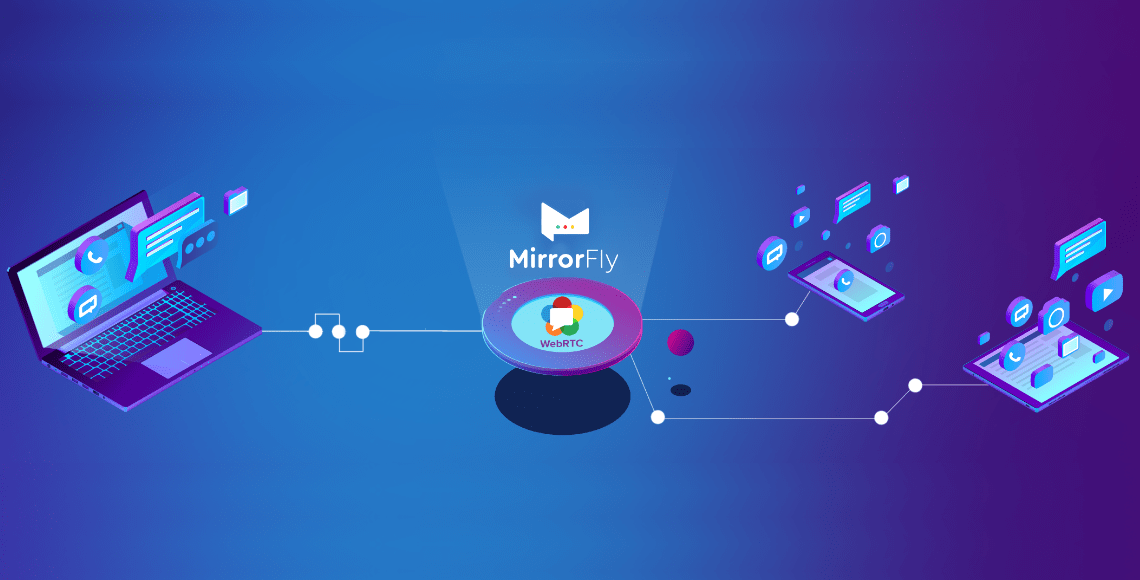
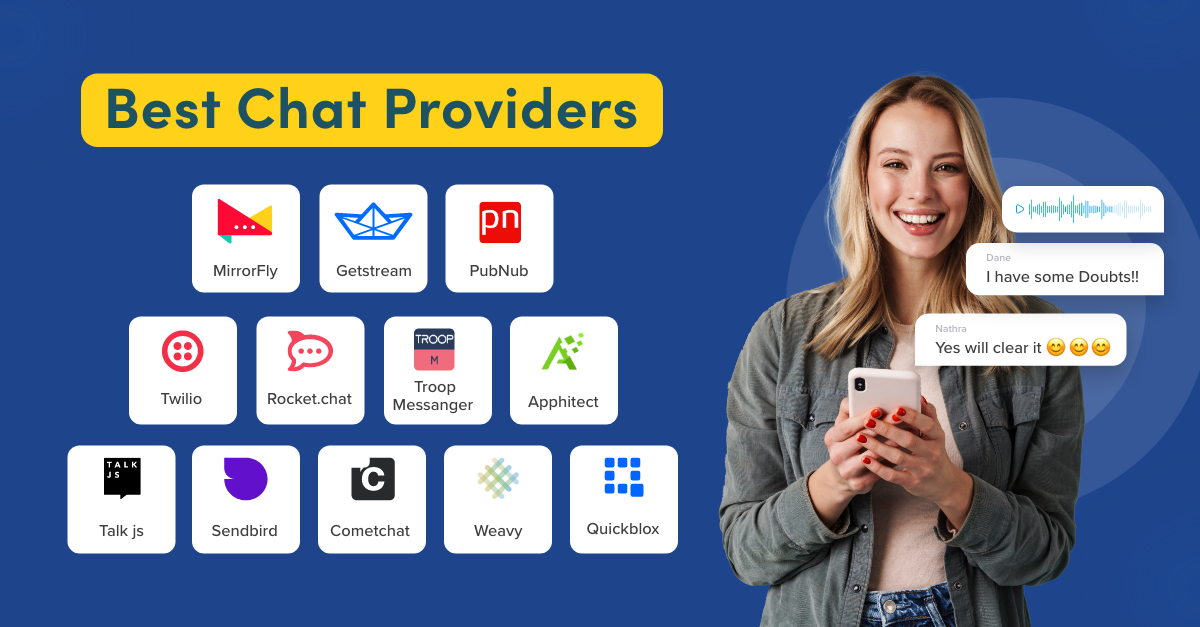
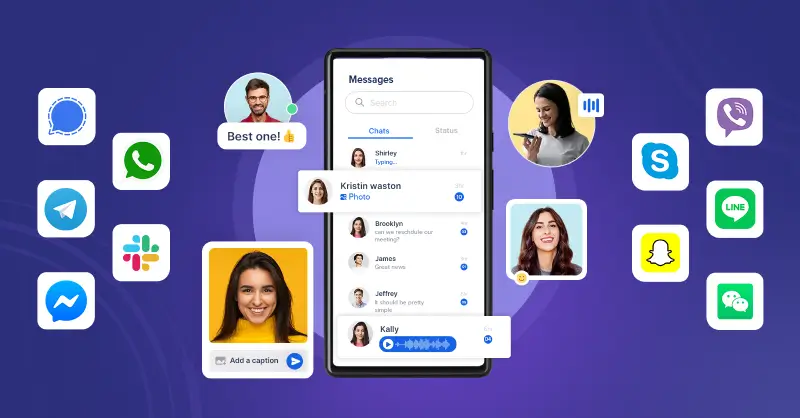
With the Voice Call API, you can integrate voice calling functionality into your new and existing applications and services. This allows you to make and receive phone calls, automate customer support, send alerts, and create interactive voice response systems. You can also enhance user experiences by enabling voice commands, surveys, and more. The Voice Call API offers versatile communication options for businesses, from customer engagement to streamlining operations.
Hey,
I’m Completely strange to this topic can you define shortly What can I do with the Voice Call API?
Hello Guys,
Can I ask you something that Could I use the Voice Call API internationally? for all I know it might be a big question for people who went through this article. Hope this will help us to know a brief of this blog
Yes Sanjay,
you can use the Voice Call API internationally, but the availability and pricing may vary depending on your service provider and the countries you intend to call. Be sure to check with your API provider for specific details and any potential restrictions or additional charges for international usage.
Hi team,
This blog was really nice and keep on posting, here you have already explore the features of voice call API can you specify that which are the main features first? It might be helpful
Hello Ameen,
Thank you for your responses, here I list out the features which are specific under voice call APIs’
Call conferencing, Audio playback, Call recording, Audio Streaming, and Programmable SIP are some of the voice call features that are essential for any enterprise app.
You can also add features like Speech Synthesis Markup Language (SSML), call queuing, routing, and audio encryption depending on your business model and user requirements.
could you explain me how do I get started with the Voice Call API for Enterprises?
yes,
So if you want to get started, follow the below steps so that you can get a quick information.
Sign up for an account with the Voice Call API provider.
Obtain the API documentation, including authentication details and API endpoints.
Choose your preferred programming language and integrate the API into your application.
Test the integration using sandbox or test environments to ensure everything is functioning correctly.
Start making real voice calls with the API once your application is ready for production.
hello,
your blog was simply good, I have a doubt does voice call api secure for all enterprise?
Enterprise-level Voice Call APIs often prioritize security and data privacy. Look for providers that offer encryption for voice data transmission and storage, secure authentication mechanisms, and compliance with industry standards like GDPR (General Data Protection Regulation) or HIPAA (Health Insurance Portability and Accountability Act) if handling sensitive data.
Hi, nice article, can you clear me that which programming languages are supported by the Voice Call API?
Sure veerav,
we ready to share you The supported programming languages may vary depending on the service provider offering the Voice Call API. However, popular APIs typically support multiple programming languages, such as Python, JavaScript (Node.js), Java, C#, Ruby, and PHP.
We need to build a voice chat app that will have the ability to make audio/video calls. My Product based on education. Please reply back to me with some more info. Thanks